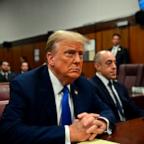Stocks drop on concern about the auto industry's future
NEW YORK -- Stocks slumped Friday as the Senate's rejection of a $14 billion lifeline for the auto industry intensified investors' concerns about a deepening recession.
Defeat of the bailout bill late Thursday prompted calls for the Bush administration to use a portion of the $700 billion financial rescue package to prop up the struggling companies. The bill failed after the United Auto Workers refused to meet Republican demands for big wage cuts.
More evidence of the battered labor market came late Thursday, as Bank of America said it expected to cut as many as 35,000 jobs over the next three years, including some from investment bank Merrill Lynch, which it agreed to buy in September.
Friday's economic reports, falling retail sales and wholesale prices, underscored investors' growing fear of a severe and prolonged recession. The data followed the Labor Department's announcement Thursday that initial jobless claims rose to the highest level in 26 years last week.
If one of the automakers declared bankruptcy, some estimate as many as 3 million jobs could be lost next year.
Bond prices rose Friday. The yield on the benchmark 10-year Treasury note, which moves opposite its price, fell to 2.57% from 2.63% late Thursday. The yield on the three-month T-bill dipped to 0.01% from 0.02% late Thursday. The bill has been in great demand because of the safety it offers investors. Higher prices push down the yield.
The dollar was mixed against other major currencies, while gold prices fell.
Light, sweet crude fell $3.53 to $44.45 in electronic premarket trading on the New York Mercantile Exchange.
Markets overseas plunged in response to the failed auto bailout bill. Meanwhile, British Prime Minister Gordon Brown said European Union leaders have agreed on a $267 billion economic stimulus package to rescue their recession-hit economies. Japanese Prime Minister Taro Aso also announced a new stimulus package to shore up his country's economy. The package includes $111 billion in tax breaks and public financing and $144 billion to prop up financial markets.




